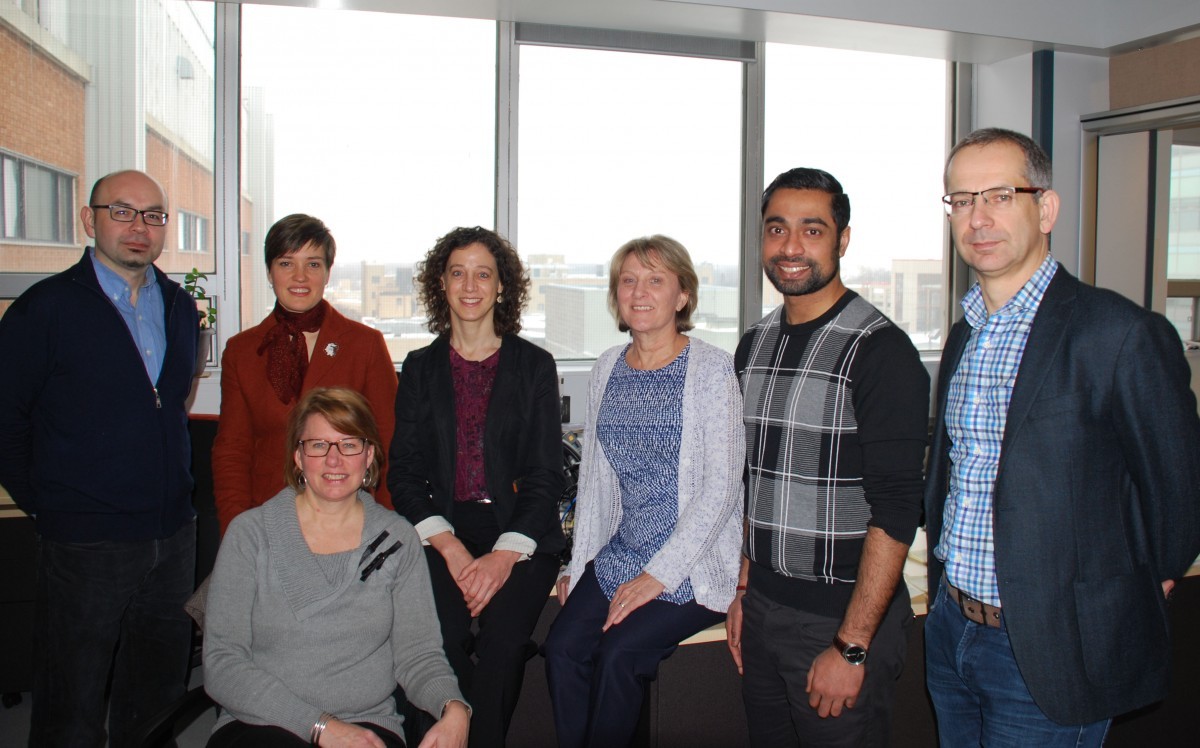
L-R: Rick Harp, Harpa Isfeld-Kiely, Margaret Haworth-Brockman (seated), Marissa Becker, Terri Neville, Shivoan Balakumar and Yoav Keynan.
Bringing Evidence on Infectious Diseases into Practice
New, U of M–based centre opens doors to students
The University of Manitoba, a trailblazer in infectious disease research around the world, is now home to a national centre dedicated to improving public health practice and that will provide U of M students exciting new opportunities for training, research and collaboration.
The National Collaborating Centre for Infectious Diseases (NCCID), hosted by the University of Manitoba Faculty of Health Sciences, equips front-line public health workers with evidence to use in their practice and in formulating policy to combat potentially devastating infectious diseases.
The NCCID forges connections between those who generate, and those who rely on, infectious disease public health knowledge. The target audience is public health personnel including practitioners, bench scientists, as well as policy makers and programmers from the grassroots up to national and federal levels.
“Our knowledge translation brings evidence into the hands of public health workers who can then use it in their practice and policy,” said Margaret Haworth-Brockman, Senior Program Manager for NCCID. “We are charged with helping to find that evidence and making it accessible, or summarizing it and putting it into plain language, depending on the needs of the audience.”
NCCID is one of six National Collaborating Centres for Public Health collectively called the National Collaborating Centres for Public Health. Funded by the Public Health Agency of Canada, each focuses on a different area of public health. The centres were established following the Severe Acute Respiratory Syndrome (SARS) outbreak in 2003 to facilitate the use of evidence and emerging research for improved public health policy and practice.
To that end, NCCID generates summaries for policy makers along with in-depth reports among a range of other resources and communication platforms available on its website nccid.ca. Additionally, staff also head out into the field to lead seminars and workshops with front–line personnel. Haworth-Brockman co-led a workshop in Montreal in February with the Aboriginal Nurses Association of Canada focusing on how to identify and assess whether evidence is credible, in the context of HIV, for instance.
NCCID recently opened its doors on Bannatyne Campus. “The University of Manitoba has been a leader in infectious diseases research and the fit of the centre within the university is in line with the University strategic plan,” said Dr. Yoav Keynan, assistant professor in the departments of Medical Microbiology, Internal Medicine and Community Health Sciences, College of Medicine.
The scientific direction for the NCCID, which will be permanently located in the Basic Medical Sciences Building, is shared between co-scientific directors Drs. Keynan and Marissa Becker, supported by a university management group and an external advisory board.
The centre will offer opportunities for graduate, post-graduates and students in clinical training programs from U of M -as well as from other Canadian academic institutions – with an interest in infectious diseases and public health knowledge translation.
The NCCID has identified five key areas of knowledge translation: emerging infectious diseases and zoonoses; immunization and respiratory infections; antimicrobial resistance; HIV and Sexually Transmitted Infections (STI); and other diseases to which vulnerable populations are susceptible, such as tuberculosis.
“Our close links with the department of medical microbiology, community health sciences, internal medicine, the National Microbiology Laboratory, and the National Laboratory for HIV Reference at the JC Wilt Infectious Diseases Research Centre in Winnipeg provide ample opportunities for collaboration,” said Keynan. “We plan to have trainees with diverse backgrounds involved in our projects – who could well be graduate students from the university – thus enriching the content and building capacity.”






